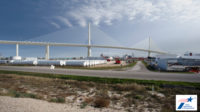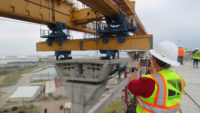Bridges
TxDOT Outlines 'Highly Problematic' Design Issues With Halted Corpus Christi Bridge

Crews work on the southern approach of the future Harbor Bridge in June 2022. Texas Dept. of Transportation officials have since ordered a temporary suspension of bridge span superstructure work over design safety concerns.
Photo courtesy of Harbor Bridge Project
The Texas Dept. of Transportation halted some work on its Corpus Christi Harbor Bridge replacement project in July after an independent engineering review found “significant design flaws that raise serious concerns about the safety” of the bridge.
TxDOT announced that it had temporarily suspended work on the bridge span superstructure July 15 over then-unspecified “safety issues.” The agency recently released the letter it sent to the Flatiron/Dragados joint venture building the bridge, revealing more details about the concerns. The design issues were discovered during an independent review by International Bridge Technologies (IBT), a subsidiary of French transportation engineering firm SYSTRA.
“Currently there are concerns on the part of TxDOT, our consultants and our independent reviewers that the final design of the cable-stayed bridge is highly problematic, and if built to completion, would create safety concerns,” TxDOT said in a statement on its website.
Officials halted work because the joint venture’s work schedule indicated they were preparing to install delta frames, according to the letter. But IBT’s review indicated design defects with the delta frames and their connections to adjacent precast box units.
IBT also found inadequate capacity of the pylon drilled shafts, according to the letter. It raised concerns that deficiencies in footing caps could collapse under certain load conditions. “Significant” uplift at intermediate piers and “excessive torsion and other stresses related to crane placement during construction” were also of concern, the letter states.
TxDOT’s letter indicated that IBT’s report had been delivered to the project team on April 29, but Brian Barth, deputy executive director of program delivery, wrote that Flatiron/Dragados had “failed to adequately address the nonconforming design.” The builders and the engineer-of-record, a team of Arup and CFC, had denied there were any problems with the design, Barth wrote.
A spokesperson for the project team declined to comment on the IBT review or status of its response in addressing TxDOT’s concerns.
This is not the first time the bridge’s design has been questioned. In 2020, TxDOT removed the original engineer-of-record, FIGG Bridge Engineers, from the project following a National Transportation Safety Board review on the collapse of a Miami pedestrian bridge the firm had designed. Arup and CFC were added as the new engineer-of-record later that year.
The plans call for a 1,661-ft-long, six-lane-wide main span carrying Interstate 37, U.S. 181 and State Highway 286 over the Corpus Christi Ship Channel. Other connecting roads and an interchange will also be reconstructed, and the current bridge will be demolished following completion of the new bridge. The U.S. Dept. of Transportation’s Federal Highway Administration had estimated the total cost at $1.1 billion.
In its most recently posted construction update, the project team reported that crews had used a gantry crane to place four span lifts on the southern approach during June.




